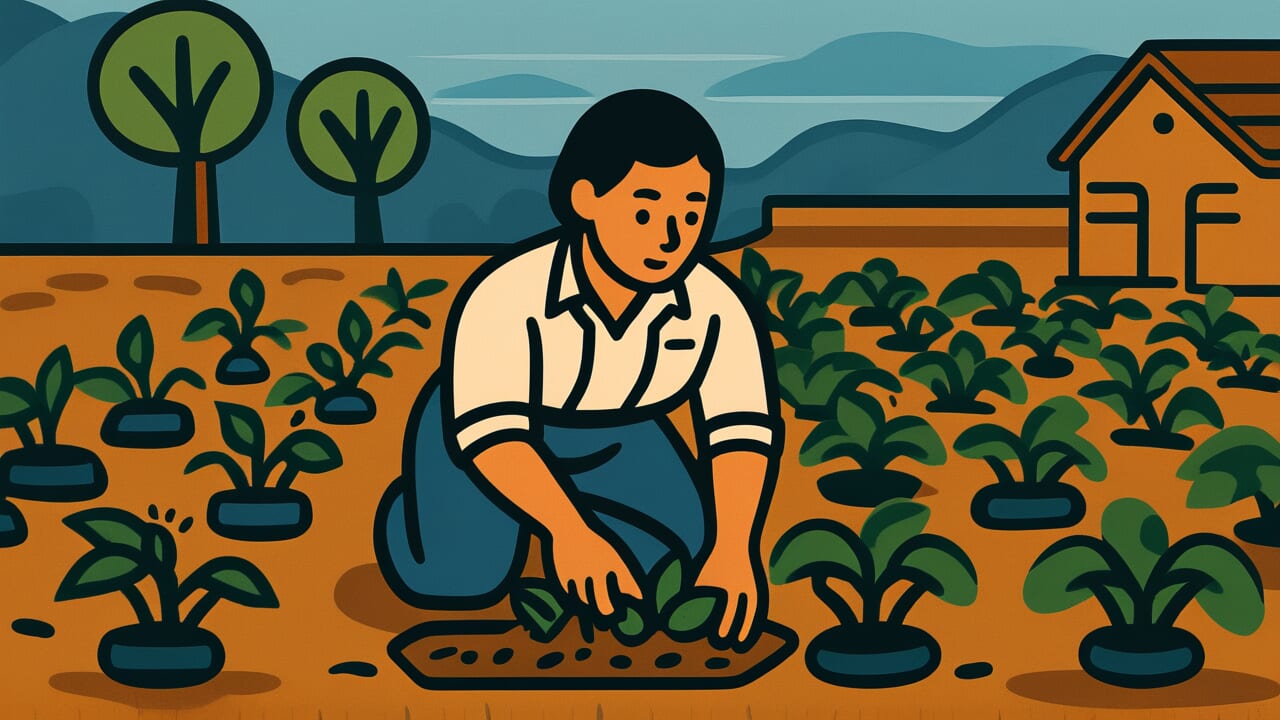How to Read “Like planting seedlings when facing starvation”
Ue ni nozomite nae wo uuru gotoshi
Meaning of “Like planting seedlings when facing starvation”
“Like planting seedlings when facing starvation” means it’s too late to prepare once you’re in a desperate situation.
When you’re starving and need food immediately, planting seedlings won’t help. It takes months before harvest, so it does nothing for your immediate hunger.
This proverb shows that everything requires preparation time. Starting to deal with a problem after it happens is often too late.
People use this saying for situations like studying the night before an exam, caring about health only after getting sick, or thinking about solutions only after trouble strikes.
This lesson remains vital in modern society. Getting qualifications, saving money, and building relationships all take time. None can be achieved overnight.
When you rush to prepare only after you need something, it’s already too late. This proverb teaches us the importance of preparing ahead by looking to the future.
Origin and Etymology
The exact source of this proverb isn’t identified. It likely came from ancient Chinese philosophy and agricultural wisdom.
Looking at the phrase structure, “facing starvation” describes a critical crisis situation. “Planting seedlings” refers to planting rice or wheat seedlings in fields.
In agricultural societies, everyone knew crops need time to grow. From planting to harvest takes several months for rice and wheat alike.
If you plant seedlings when you’re already hungry, they won’t grow fast enough to eat. The long growing time means they can’t satisfy your immediate hunger.
This expression focuses on the time element inherent in farming. Agricultural work has proper seasons, and missing them brings irreversible consequences.
The harsh reality lies behind this proverb. Plant in spring, nurture in summer, harvest in autumn. This natural cycle can’t be changed by human convenience.
From this agricultural reality, the lesson emerged. Things need preparation time, and dealing with them in desperation won’t work.
Usage Examples
- Starting to study for certifications after job hunting begins is like planting seedlings when facing starvation
- I lived without thinking about retirement, but I realized this is like planting seedlings when facing starvation
Universal Wisdom
The proverb “Like planting seedlings when facing starvation” brilliantly captures human weakness and the absolute constraint of time.
Why do people rush to prepare only when they need something? It’s because of human nature. We can’t feel the importance of something until crisis approaches.
Distant future problems feel like someone else’s concern. We prioritize today’s comfort and postpone tomorrow’s preparation. This tendency has remained unchanged from ancient times to today.
This proverb has been passed down because it shows an undeniable fact. No one can manipulate time.
No matter how anxious you become or how much you regret, lost time never returns. Seedlings need time to grow, and this natural law can’t be changed by human convenience.
Our ancestors learned this unchangeable truth from their daily farming work. Preparation takes time, so we must prepare with margin.
This wisdom applies to every aspect of life. It still speaks to us today as a universal lesson.
When AI Hears This
Research shows the human brain values a reward today at 100 but values the same reward one year later at only 50. This phenomenon is called temporal discounting.
More interesting is how this discount rate changes with time. The difference between today and tomorrow feels huge, but the difference between day 365 and day 366 feels negligible. This is called hyperbolic discounting.
Let’s quantify this proverb’s situation. For a starving person, eating the seeds now has a value of 100. Planting them would objectively yield a harvest worth 1000 in three months.
But hyperbolic discounting makes the brain feel “1000 in three months” as only “30 now.” So the comparison becomes 100 versus 30, making eating the seeds seem rational.
This cognitive distortion appears everywhere in modern society. People who use revolving credit at 15 percent annual interest feel future repayment pain as only one-tenth of its real value.
Climate change action stalls because catastrophic damage 50 years away feels surprisingly small when converted to present value. This proverb identified a mathematical cognitive bias built into the human brain over 2000 years ago.
Lessons for Today
This proverb teaches us a truth: “Today’s actions create tomorrow’s self.”
Modern society overflows with things that give instant results. One click buys products, and searches instantly find answers.
But truly valuable things still require time. Health, knowledge, trust relationships, and financial stability all build only through daily accumulation.
If you can spend a little time today for your future, it will surely bear fruit. Thirty minutes of daily study, small monthly savings, and regular exercise all count.
By continuing to plant small seeds, you won’t panic when the time comes. What matters isn’t pursuing perfection. It’s starting today.
Prepare a little today for what you might need tomorrow. This habit will protect you from “facing starvation” situations.
It will be the best gift to your future self.



Comments